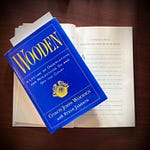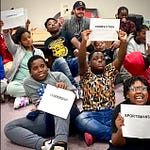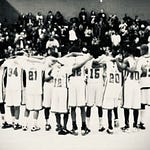My book, Endless Teachable Moments - An Expression on the Art and Education of Sport, is scheduled for official release on September 21st. In this blog and podcast, I’ve added a poem and excerpts from the book. The book is somewhat of a poetic memoir written from several seasons of life: a young boy who used sport to overcome tragedy, an evolved athlete, a coach, and a teacher. The poem in this episode - On Fearing the Teachable Moment - is from the lens of a coach and teacher.
For the sake of simplicity, I use the word educators to represent both teachers and coaches. I use the word children to represent athletes and students, young and old.
I’ve been a coach and a teacher, a coach of teachers, and a teacher of coaches. I’ve lived through all the fears I’m going to talk about in this episode. If I did anything well in those leadership capacities, it was the consistent acknowledgment of often undiscussed teaching fears. I was okay with putting a name and a face to the fear and letting educators know I get it. I’ve been there. I know what you’re feeling. It was important to get to the truth of the matter. I’ve always been one that would rather come face to face with fear, as opposed to pretending it doesn’t exist. It really does simplify everything. It clears a path for real growth.
Before discussing such fears, let’s talk teaching and teachable moments. Teachable moments come to us in sport and in the classroom, nearly every single day. What exactly is a teachable moment? Well, it’s not always born of failure on the part of the child or the team or the class. It’s born of many things: failures, successes, choices, attitude, presence, responses, reactions, and sometimes moments that didn’t involve the children at all. These occurrences can be both big and small, but they all have educational potential and a message worth expressing.
The first page of my book starts with a definition, poetically defined of course. I write:
“Poetically defined, a teachable moment is an occurrence of educational potential and value. It is a choice, a response, a result, or a circumstance through which an applicable life-value can be absorbed or taught in the moment and/or reflected upon in the years to come.”
I remember telling my assistants and many other educators what I loved most about coaching: the teachable moments were endless. They occur every day and we must learn how to capitalize on them, every day. We must do our very best to catch a moment in sport or in the classroom that is relatable to real life, and we have to provide application, over and over and over again. We cannot let the teachable moment drift away out of fear. No better and more innocent place to teach life values than through sport or in a classroom.
This, I think, is the most difficult challenge for educators. Capturing the teachable moment requires many things, none more important than courage - an unconquerable will, as Grantland Rice would say. We simply have to believe in ourselves. We have to believe we are worthy enough to give life lessons to other human beings. Who am I to teach about life and values with all of my flaws? Who are you not to be, I ask. Let’s live in truth: self-confidence is an undeniable obstacle we must overcome in the journey of good to great teaching. Education requires a shedding of our personal insecurities in order to be a comprehensive planter of educational seeds that may bloom within our children someday.
I warn leaders of passive choices early in the book with this, a quote, I think drenched in truth:
“In your wiser years, you’ll respect the leader who mustered the courage to consistently address the teachable moments, and, as consequence of wisdom, you’ll resent the leader who didn’t.”
But why are the fears of educators so complicated? What makes teaching so complex? What makes us hesitate to address the teachable moment? Because it is personal. Because it’s vulnerable. Because we are afraid of the response. Because we are afraid of rejection. Because a bad day as an educator can crush your soul, and that’s not an exaggeration. That’s not a dramatic statement. It’s truth. The feeling of letting children down when you look in the mirror at night can create anxiety like almost nothing else can. Great content knowledge does not guarantee great teaching or great culture. A high winning percentage does not mean there is educational value in the program.
So how do we face these fears? How do we become a comprehensive educator, an executor of the teachable moments? Let’s go face to face with it:
We have to value life education. Educators must be determined to prioritize life-values and culture before becoming winners or losers. Prioritizing outcomes before all other aspects will cloud our judgment and deprioritize culture. Sure, we must aim for results. Children deserve the opportunity for high results. But how can we achieve the highest results without great culture?
We have to develop an eye for the teachable moment. They are born of failures and successes. They are not always based on deficit or mishap. To know when a moment has surfaced requires life experience, professional practice, awareness, and study. We’re very lucky if we had educators who tried to apply life values to sport or the classroom. We were even luckier if they were good at it.
We have to choose to address the teachable moment. It’s a choice. This takes courage and readiness. It takes toughness. It requires we shed personal resistance because of the temporary discomfort of addressing the moment or the child. We have to go for it. Children will appreciate that choice someday.
We have to know our message and our values. Teaching and coaching are two of the best occupations in self-exploration and self-knowledge. You learn about yourself quickly. How can you have a message until you know yourself and your core values? If we are to deliver messages on values, we must determine and develop our own. And we have to live out those values, which can be very, very difficult.
We must have discipline. The teachable moments are plentiful. We have to be ready and willing to address to the teachable moments, time and time again, no matter how many times we repeat the common message in the common moment. We will regret letting one drift away. Our children may find momentary comfort in being let off the hook, but in time they will resent the leader who chose to lower expectations. Better they know what you are going to say before you say it, and even if they do, still best you choose to say it. Best the children say you do too much than too little. Best they mimic your messages—verbatim—then not know your message at all.
We can’t make excuses. We can’t blame anything for our choice to let the teachable moment slide. Not the system, not the environment, not the organization, not the children, not others who consistently let the teachable moment drift away. It’s on us. Don’t join the passive crowd. Our children deserve more.
We have to be growth-oriented. We must be in constant pursuit of growth. We will never be perfect. We must study and learn and practice our understanding of teachable moments. We must be willing to learn. We must be willing to practice our craft. We’re not doing enough if we don’t study educators who are experts at delivering the message when a teachable moment occurs.
We can’t be afraid of the children. This statement raises many eyebrows, and I’m glad it does. It’s grabs attention. If we fear a child’s response or reaction, then we are choosing to fear them and that’s not their fault. Fearing them keeps us from planting even the smallest of seeds. I’ve coached educators in the past, and often the conversation on the struggling discipline and culture of the team or classroom environment is met with a passive blame of other people, systems, or circumstances. I would simply say, don’t be so afraid of the children. I’m still amazed at how much impact this statement made. Rare do we find complete human ownership around team culture, but when you find a leader who owns it, keep them. They’ll grow quickly.
We can’t let fear of failure stop us. Failure will happen. We may not be very good at our original message or attempt. We’ll get it wrong. It won’t hit the mark the way we intended. But we must gain repetitions in our messaging and delivery. There is an art to the delivery, but we’ll never learn that art if we live in fear of failure, and that fear, consequently, may eliminate our decision to just try.
We can’t be afraid of ourselves. Oh, how I love Marianne Williamson’s timeless poem, Our Deepest Fear. It presents this complex fear in a deeper and more meaningful way than I could ever hope to do.
Our Deepest Fear
Our deepest fear is not that we are inadequate.
Our deepest fear is that we are powerful beyond measure.
It is our Light, not our Darkness, that most frightens us.
We ask ourselves, who am I to be brilliant, gorgeous, talented, fabulous?
Actually, who are you not to be?
You are a child of God. Your playing small does not serve the World.
There is nothing enlightening about shrinking
so that other people won’t feel unsure around you.
We were born to make manifest the glory of God that is within us.
It is not just in some of us; it is in everyone.
As we let our own Light shine,
we consciously give other people permission to do the same.
As we are liberated from our own fear,
our presence automatically liberates others.
It took me, I’d say, about a hundred repetitions of reading this poem over many years to understand the depth of the fear that Marianne was expressing. For the educator, you may actually be great. You may be greater than other educators. You may just be exactly what a child needs. You may exist in a world in which your continuous attempt at capturing the teachable moments are frowned upon by others that do not have your same discipline or desire. You may just be different. I hope you find peace with that in time. I hope you overcome the natural fear of yourself, and anything from your past or present that contributes to it. But remember this, you may never know if are powerful beyond measure if you do not try - always better to try and fail then to never try at all. In the end, children will always remember the try, and so will you.
I’ll leave the educators with this poem from my book. It’s an expression of a mindset I had to attempt to reach each day as a coach and teacher. Perhaps it provides a bit of inspiration and a nudge to be okay with the possible greatness within you:
On Fearing the Teachable Moment Educators of great and little acumen, Of great and little experience, Of great and little resume, Share, consequently, the same human fear. This common fear fills like water rising, When the teachable moment occurs, When it comes face to face. A fear that their teaching will be rejected Or wildly unpopular for a second, And that conflict will not feel good, For all the personal reasons. So they pause, letting the teachable moment float away. Responsibility drifts off, Unable to return To disrupt the safer shores of momentary silence. They convince themselves of why - A series of sophisticated excuses, Perhaps blaming the system, Or the child. One decision to look the other way, Keeps the educator from joining the outliers Who took a chance at failing Or succeeding, And being exactly what the student needed, Despite the momentary discomfort Of being authentic, in an authentic moment, Vulnerable, in a vulnerable moment. So don't be so afraid Of people, or decisions, or discomfort, or yourself.
There will be a teachable moment today. Capture it.
Be great and break barriers,
Jason Aron Ronai













Share this post